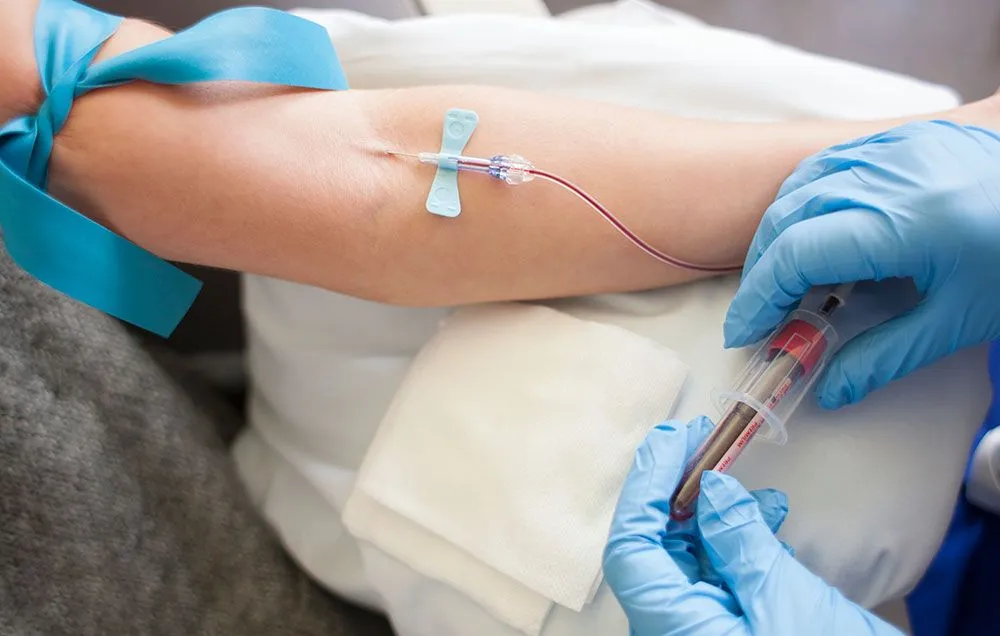Looking for convenient and reliable laboratories for blood work near you? Look no further! We understand the importance of accurate and timely results when it comes to your health. That’s why we’ve compiled a comprehensive guide for you to choose the best laboratory in your area.
Our brand, Vesta Care, is committed to helping you make informed decisions about your healthcare. With just a few clicks, you can easily locate a provider near you that offers the best services you need. Whether you require routine blood tests or more specialized diagnostics, our curated database ensures you have access to the best facilities.
At Vesta Care, we prioritize convenience and reliability. Our partner lab is equipped with state-of-the-art technology and staffed by experienced DHA Licensed professionals who prioritize patient care. Rest assured, you can trust the accuracy and precision of the results provided. Our goal is to help you maintain optimal health and well-being.
Don’t waste time searching for laboratories for blood work near me. Let us simplify the process and help you find the most convenient and reliable options. Start your search now and take control of your health today with Vesta Care.
Importance of blood work
Blood work plays a crucial role in maintaining good health and preventing potential health issues. It provides valuable insights into your overall health and helps identify any underlying conditions or abnormalities that may need attention. By analyzing various components of your blood, healthcare professionals can assess your organ function, detect infections, monitor medication effectiveness, and screen for diseases such as diabetes, high cholesterol, and cancer.
Getting regular blood work done is a proactive approach to managing your health. It allows you and your healthcare provider to monitor any changes over time, catch potential issues early on, and take appropriate measures to prevent or treat them. Regular blood work can help you stay on top of your health and make informed decisions regarding your lifestyle, diet, and treatment plans.
Additionally, blood work is often a crucial step before undergoing surgeries, starting certain medications, or participating in clinical trials. It helps ensure that you are in optimal health and minimizes the risk of complications. Therefore, it is essential to find convenient and reliable laboratories for blood work near you to ensure accurate results and timely diagnoses.
What is blood work?
Blood work, also known as a blood test or blood panel, is a medical procedure that involves analyzing a sample of your blood to evaluate your overall health and diagnose any potential conditions or diseases. It involves collecting a small amount of blood through a needle or a finger prick and sending it to a laboratory for analysis. The laboratory technicians then examine the sample and provide a detailed report of the findings.
Blood work can encompass a wide range of tests, depending on the specific requirements and concerns of the patient. These tests can measure various components of your blood, such as red and white blood cell counts, platelet levels, glucose levels, cholesterol levels, liver function, kidney function, hormone levels, and more. The specific tests conducted will depend on your symptoms, medical history, and the recommendations of your healthcare provider.
By analyzing the results of blood work, healthcare professionals can gain valuable insights into your overall health, detect any abnormalities, and make informed decisions regarding your treatment or further diagnostic tests. It serves as a valuable tool for both preventive care and disease management.
Benefits of getting blood work done
Regular blood work offers numerous benefits for your health and well-being. Here are some key advantages of getting blood work done:
1. Early Detection of Diseases: Blood work can help detect diseases and conditions at an early stage when they may be more easily treatable. For example, blood tests can identify high cholesterol levels, indicating an increased risk of heart disease. Early detection allows for timely intervention and appropriate treatment.
2. Monitoring Chronic Conditions: If you have a chronic condition such as diabetes or hypertension, regular blood work is essential for monitoring the effectiveness of your treatment and ensuring your condition is well-managed. By measuring blood sugar levels, kidney function, and other relevant markers, blood work helps healthcare providers make necessary adjustments to your treatment plan.
3. Assessing Organ Function: Blood work provides insights into the functioning of vital organs such as the liver, kidneys, and thyroid. Abnormalities in liver enzyme levels or kidney function markers can indicate underlying issues that require further investigation. Blood work helps identify potential problems before they cause significant damage.
4. Tracking Medication Safety: Certain medications require regular blood work to monitor their safety and effectiveness. For instance, blood thinners like Warfarin require frequent monitoring to ensure the dosage is appropriate and to prevent any adverse reactions. Blood work helps tailor the medication dosage to your specific needs.
5. Preventive Care: Blood work is an integral part of preventive care. It helps identify risk factors for various diseases, such as high cholesterol levels indicating a higher risk of cardiovascular disease. Armed with this knowledge, you can make lifestyle changes or start treatment early to reduce your risk.
In summary, getting blood work done offers numerous benefits, including early detection of diseases, monitoring chronic conditions, assessing organ function, tracking medication safety, and preventive care. Regular blood work allows you and your healthcare provider to take proactive steps towards maintaining optimal health.
Common Types of Blood Tests
Blood tests encompass a wide range of tests, each serving a specific purpose and providing valuable insights into your health. Here are some common types of blood tests you may encounter:
- Complete Blood Count (CBC): A CBC Test measures the number of red and white blood cells, hemoglobin levels, hematocrit, and platelet count. It helps assess overall health, detect infections, anemia, and blood disorders.
- Basic Health Checkup: A Basic Health Checkup measures blood glucose levels, electrolyte balance (sodium, potassium, chloride), kidney function (creatinine, blood urea nitrogen), and liver function (bilirubin, liver enzyme levels).
- Lipid Panel: A lipid panel measures cholesterol levels, including total cholesterol, LDL (bad cholesterol), HDL (good cholesterol), and triglycerides. It helps assess the risk of heart disease and monitor the effectiveness of cholesterol-lowering medications.
- Blood Glucose Test: This test measures blood sugar levels and helps diagnose diabetes and monitor glucose control in individuals with diabetes.
- Thyroid Function Tests: These tests assess the levels of thyroid-stimulating hormone (TSH), free T3, and free T4. They help diagnose thyroid disorders, such as hypothyroidism or hyperthyroidism.
- Liver Function Tests: These tests measure liver enzyme levels, bilirubin, and albumin. They help assess liver function and detect liver diseases or conditions.
These are just a few examples of the many types of blood tests available. The specific tests recommended for you will depend on your symptoms, medical history, and the recommendations of your healthcare provider. It’s important to consult with a healthcare professional to determine the most appropriate tests for your specific needs.
How to find laboratories for blood work near me
When it comes to finding laboratories for blood work near you, there are several avenues you can explore. Here are some effective ways to locate reliable and convenient options:
- Ask Your Healthcare Provider: Start by reaching out to your primary care physician or specialist. They can recommend trusted laboratories in your area that offer the specific tests you require. They may also provide you with referrals or prescriptions that make the process smoother. In Dubai, there are a number of home healthcare companies available to provide you lab at home service and are licensed by DHA.
- Check with Your Insurance Provider: Contact your health insurance provider and inquire about laboratories covered under your plan. Insurance companies often have a network of preferred providers, and choosing an in-network laboratory can help minimize out-of-pocket expenses.
- Online Search: Conduct an online search using keywords like “laboratories for blood work near me” or “blood testing facilities in Dubai.” This will yield a list of laboratories in your area along with reviews and ratings from other patients. Take note of the highly-rated options and read patient feedback to get a sense of the quality of service provided.
- Mobile Apps and Websites: Utilize mobile applications or websites that specialize in helping users find healthcare services, including laboratories for blood work. These platforms often provide detailed information about each laboratory, including services offered, location, hours of operation, and user reviews.
- Ask for Recommendations: Seek recommendations from friends, family members, or colleagues who have recently undergone blood work. They can provide firsthand experiences and suggest laboratories they found reliable and convenient.
Remember to consider factors such as the laboratory’s reputation, operating hours, appointment availability, and whether they offer the specific tests you require. It’s also important to verify the laboratory’s accreditation and certifications to ensure they meet industry standards for quality and accuracy.
Factors to consider when choosing a laboratory
Choosing the right laboratory for your blood work is essential to ensure accurate results and a positive experience. Here are some key factors to consider when making your decision:
- Accreditation and Certifications: Look for laboratories that are accredited by reputable organizations. These accreditations ensure that the laboratory meets rigorous quality and safety standards.
- Expertise and Experience: Consider the laboratory’s expertise in the specific tests you require. Look for laboratories that specialize in the areas relevant to your health concerns. Experienced technicians and healthcare professionals are more likely to provide accurate results and a seamless testing experience.
- Technology and Equipment: Ensure that the laboratory is equipped with state-of-the-art technology and equipment. Advanced equipment improves the accuracy and efficiency of testing, resulting in reliable results and faster turnaround times.
- Turnaround Time: Consider the laboratory’s turnaround time for delivering results. Quick turnaround times are important, especially if you require urgent results or need to make timely treatment decisions.
- Convenience and Accessibility: Evaluate the laboratory’s location, operating hours, and appointment availability. Choose a laboratory that is conveniently located, has flexible hours, and offers online appointment booking options. With home healthcare services like Vesta Care, you can have the convenience of of blood sample collection from home 24/7.
- Insurance Coverage: Check if the laboratory accepts your health insurance and whether they are in-network or out-of-network. In-network laboratories typically have lower out-of-pocket costs for insured individuals.
- Patient Reviews and Feedback: Read patient reviews and feedback about the laboratory’s services. Positive reviews indicate a track record of reliable and satisfactory testing experiences.
By considering these factors, you can make an informed decision and choose a laboratory that meets your specific needs and preferences.
Convenience and reliability of laboratories for blood work near me
When it comes to laboratories for blood work near you, convenience and reliability are key factors to ensure a positive experience. Here’s why these factors are crucial:
- Convenience: Choosing a home service can save you time and effort. Opting for a lab at home or workplace allows for easy access and minimizes travel time.
- Efficient Processes: Reliable laboratories have efficient processes in place, ensuring that your blood work is conducted smoothly and without unnecessary delays. From the moment you arrive at the laboratory to receiving your results, every step should be well-organized and efficient.
- Accuracy and Precision: Reliability is of utmost importance when it comes to blood work. Choose laboratories that have a reputation for accurate and precise results. Accredited laboratories with experienced technicians and advanced equipment are more likely to provide reliable results.
- Secure Handling of Samples: Laboratories that adhere to strict protocols for handling and storing samples ensure the integrity of your blood work. Look for laboratories that prioritize sample security and follow industry best practices.
By prioritizing convenience and reliability, you can ensure a seamless and stress-free experience when getting your blood work done.
Insurance coverage for blood work
Understanding your health insurance coverage for blood work is essential to avoid unexpected costs. Here are some key points to consider:
- In-Network vs. Out-of-Network: In-network laboratories have negotiated rates with your insurance provider, resulting in lower out-of-pocket costs for you. It’s recommended to choose an in-network laboratory whenever possible to maximize your insurance benefits. Out-of-network laboratories may result in higher out-of-pocket expenses or limited coverage.
- Coverage for Specific Tests: Review your insurance plan to understand which blood tests are covered and to what extent. Some tests may be fully covered, while others may require partial payment or fall under your deductible. Knowing the coverage details helps you plan accordingly and avoid surprises.
- Pre-Authorization Requirements: Certain blood tests may require pre-authorization from your insurance provider. Pre-authorization ensures that the test is medically necessary and covered under your plan. Failing to obtain pre-authorization may result in denied coverage or higher out-of-pocket costs.
- Co-Payments and Deductibles: Familiarize yourself with your insurance plan’s co-payment and deductible requirements. Co-payments are fixed amounts you pay for each visit or service, while deductibles are the amount you must pay out-of-pocket before your insurance starts covering costs. Understanding these costs helps you budget for your blood work expenses.
- Out-of-Pocket Maximum: Determine your plan’s out-of-pocket maximum, which is the most you’ll have to pay in a calendar year. Once you reach this maximum, your insurance provider covers 100% of eligible expenses. It’s important to keep track of your expenses to ensure you don’t exceed this limit.
Remember to contact your insurance provider directly for any specific questions regarding coverage, in-network laboratories, or pre-authorization requirements. They can provide you with the most accurate and up-to-date information regarding your insurance benefits.
Preparing for blood work
Preparing for blood work can help ensure accurate results and a smooth testing experience. Here are some general guidelines to follow:
- Follow Fasting Instructions: Some blood tests, such as cholesterol or glucose tests, require fasting beforehand. This typically means refraining from eating or drinking anything except water for a specific period, usually 8 to 12 hours. Fasting helps provide accurate baseline measurements for these tests. Make sure to follow the fasting instructions provided by your healthcare provider or the laboratory.
- Stay Hydrated: Drink plenty of water before your blood work appointment, unless instructed otherwise. Being well-hydrated makes it easier for the technician to draw blood and can help prevent dizziness
Conclusion
When it comes to your health, choosing a convenient and reliable laboratory for blood work near you is vital. By prioritizing accreditation, advanced technology, range of services, convenience, and turnaround time, you can ensure that you receive accurate and timely results. Explore the top laboratories mentioned above and take control of your health today. Simplify your search for laboratories for blood work near me with Vesta Care and make informed decisions about your healthcare.




